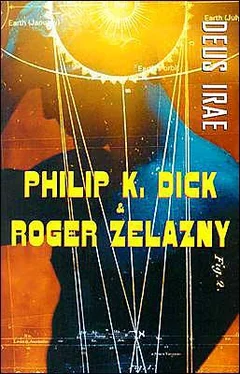“ ‘I think I do,’ “ he wailed back, finishing the quotation.
“ ‘That duty, duty must be done,’ “ he said, then. The coffee cup was set down, an elaborate rejection costing the use of many surge-gates opening and closing.
“ ‘The rule,’ “ Father Handy said, “ ‘applies to everyone.’ “
Half to himself, with real bitterness, Tibor said, “ ‘To shirk the task.’ “ He turned his head, licked rapidly with his expert tongue, and gazed in deep, prolonged study at the priest. “What is it?”
It is, Father Handy thought, the fact that I am linked; I am part of a network that whips and quivers with the whole chain, shivered from above. And we believe—as you know—that the final motion is given from that Elsewhere that we receive the dim emanations out of, data which we strive honestly to understand and fulfill because we believe—we know—that what it wants is not only strong but correct.
“We’re not slaves,” he said aloud. “We are, after all, servants. We can quit; you can. Even I, if I felt it was right.” But he would never; he had long ago decided, and taken a secret binding oath on it. “Who makes you do your job here?” he said, then.
Tibor said cautiously, “Well, you pay me.”
“But I don’t compel you.”
“I have to eat. That does.”
Father Handy said, “We know this: you can find many jobs, at any place; you could be anywhere working. Despite your—handicap.”
“The Dresden Amen,” Tibor said.
“Eh? What?” He did not understand.
“Sometime,” Tibor said, “when you have the generator reconnected to the electronic organ, I’ll play it for you; you’ll recognize it. The Dresden Amen rises high. It points to an Above. Where you are bullied from.”
“Oh no,” Father Handy protested.
“Oh yes,” Tibor said sardonically, and his pinched face withered with the abuse of his mis-emotion, his conviction. “Even if it’s ‘good,’ a benign power. It still makes you do things. Just tell me this: Do I have to paint out anything I’ve already done? Or does this deal with the over-all mural?”
“With the final composition; what you’ve done is excellent. The color thirty-five-millimeter slides we sent on—they were delighted, those who looked at them; you know, the Church Eltern.”
Reflecting, Tibor said, “Strange. You can still get color film and get it processed. But you can’t get a daily newspaper.”
“Well, there’s the six-o’clock news on the radio,” Father Handy pointed out. “From Salt Lake City.” He waited hopefully. There was no answer; the limbless man drank the coffee silently. “Do you know,” Father Handy said, “what the oldest word in the English language is?”
“No,” Tibor said.
‘“Might,”‘ Father Handy said. “In the sense of being mighty. It’s Macht in the German. But it goes further back than Teutonic; it goes all the way back to the Hittites.”
“Hmmm.”
“The Hittite word mekkis. ‘Power.’ “ Again he waited hopefully. “ ‘Did you not chatter? Is this not woman’s way?’ “ He was quoting from Mozart’s Magic Flute. “ ‘Man’s way,’ “ he finished, “ ‘is action.’ “
Tibor said, “You’re the one who’s chattering.”
“But you,” Father Handy said, “must act. I had something to tell you.” He reflected. “Oh yes. The sheep.” He had, behind the church in a five-acre pasture, six ewes. “I got a ram late yesterday,” he said, “from Theodore Benton. On loan, for breeding. Benton dumped him off while I was gone. He’s an old ram; he has gray on his muzzle.”
“Hmmm.”
“A dog came and tried to run the flock, that red Irish-setter thing of the Yeats’. You know; it runs my ewes almost daily.”
Interested now, the limbless man turned his head. “Did the ram—”
.”Five times the dog approached the flock. Five times, moving very slowly, the ram walked toward the dog, leaving the flock behind. The dog, of course, stopped and stood still when he saw the ram coming toward him, and so the ram halted and pretended; he cropped.” Father Handy smiled as he remembered. “How smart the old fellow was; I saw him crop, but he was watching the dog. The dog growled and barked, and the old fellow cropped on. And then again the dog moved in. But this time the dog ran, he bounded by the ram; he got between the ram and the flock.”
“And the flock bolted.”
“Yes. And the dog—you know how they do, learn to do—cut off one ewe, to run her down; they kill the ewe, then, or maim them, they get them from the belly.” He was silent. “And the ram. He was too old; he couldn’t run and catch up. He turned and watched.”
Both men were then, together, silent.
“Can they think?” Tibor said. “The ram, I mean.”
“I know,” Father Handy said, “what I thought. I went to get my gun. To kill the dog. I had to.”
“If it was me,” Tibor said, “if I was that ram, and I saw that, I saw the dog get by me and run the flock and all I could do was watch—” He hesitated.
“You would wish,” Father Handy said, “that you had already died.”
“Yes.”
“So death, as we teach the Servants of Wrath—we teach that it is a solution. Not an adversary, as the Christians taught, as Paul said. You remember their text. ‘Death, where is thy sting? Grave, where is thy victory?’ You see my point.”
Tibor said slowly, “If you can’t do your job, better to be dead. What is the job I have to do?”
In your mural, Father Handy thought, you must create His face.
“Him,” he said. “And as He actually is.” After a puzzled pause Tibor said, “You mean His exact physical appearance?”
“Not,” Father Handy said, “a subjective interpretation.”
“You have photos? Vid data?”
“They’ve released a few to me. To be shown to you.”
Staring at him, Tibor said, “You mean you have a photo of the Deus Irae?”
“I have a color photo in depth, what before the war they called 3-D. No animated pics, but this will be enough. I think.”
“Let’s see it.” Tiber’s tone was mixed, a compound of amazement and fear and the hostility of an artist hampered, impeded.
Passing into his inner office, Father Handy got the manila folder, came back with it, opened it, brought out the color 3-D photo of the God of Wrath, and held it forth. Tiber’s right manual extensor seized it.
“That’s the God,” Father Handy said presently.
“Yes, you can see.” Tibor nodded. “Those black eyebrows. That interwoven black hair; the eyes… I see pain, but he’s smiling.” His extensor abruptly returned the photo. “I can’t paint him from that.”
“Why not?” But Father Handy knew why not. The photo did not really catch the god-quality; it was the photo of a man. The god-quality; it could not be recorded by celluloid coated with a silver nitrate. “He was,” he said, “at the time this photo was taken, having a luau in Hawaii. Eating young taro leaves with chicken and octopus. Enjoying himself. See the greed for the food, the lust creating an unnatural expression? He was relaxing on a Sunday afternoon before a speech before the faculty of some university; I forget which. Those happy days in the sixties.”
“If I can’t do my job,” Tibor said, “its your fault.”
“ ‘A poor workman always blames—’ “
“You’re not a box of tools.” Both manual extensors slapped at the cart. “My tools are here. I don’t blame; I use them. But you—you’re my employer; you’re telling me what to do, but how can I, from that one color shot? Tell me—”
“A Pilg. The Eltern of the Church say that if the photograph is inadequate—and it is, and we know it, all of us—then you must go on a Pilg until you find the Deus Irae, and they’ve sent documents pertaining to that.”
Читать дальше








